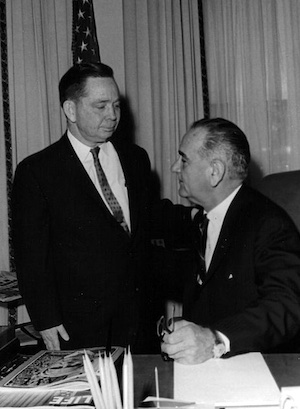By Sidhvi Reddy
Born in 1908, Carl Albert was a member of the U.S. House of Representatives, a politician who rose from poverty, striving to expand economic opportunities for his fellow Oklahomans. Born in McAlester, Oklahoma, he attended school but, like may children, also worked in the cotton fields to help his family. In describing his upbringing in his autobiography, Little Giant: The Life and Times of Speaker Carl Bert Albert, he writes: “We did not think we were poor. We had everything but money.” During his high school years, he became the student body president while also participating extensively in debate, which would later serve him well during his time in Congress. Albert attended the University of Oklahoma, where he waited tables to finance his education and subsequently graduated Phi Beta Kappa in 1931. Albert became a Rhodes Scholar and earned a B.A. and a B.C.L. at the University of Oxford. His passions guided him back to his home state where he was admitted to the bar in 1935 to practice law.
Albert entered the military in 1941 to fight in World War II, going on the achieve the rank of lieutenant colonel and win the Bronze Star, which is awarded to members of the US Armed Forces who display heroism on the field or who are meritorious in their work. Upon his return, he was elected to Congress in 1946, where he supported Truman’s policies to expand federal aid to Americans, understanding that, as a man who had experienced poverty, increased access to education and housing were integral to building a thriving economy, particularly in the post-war era. “Because my state was poor and my district poorer, federal aid was no demon; it was a deliverer,” Albert wrote. He was appointed House Majority Whip in 1955 and later elected House Majority Leader in 1961. One of the more notable policies he supported was the creation of Medicare and Medicaid in 1965, providing federal health insurance to the elderly and families experiencing financial issues. He also helped champion Lyndon B. Johnson’s Great Society legislation, a set of programs designed to advance civil rights, voting rights, education, job training, health, welfare, the environment, and the arts. Albert believed that, as an Oklahoman, engaging his constituents and state in politics would help open opportunities for poorer Americans, claiming in Little Giant that “not as a matter of economics, nor logic, nor common decency, nor in fairness to future generations, can we justify excluding the American poor from the mainstream of American life.”
Albert’s ability to consider both parties’ concerns and issues led to bipartisan praise of his leadership after his death, which can be seen today in the Carl Albert Center established at his alma mater, the University of Oklahoma, in pursuit of non-partisan teaching and research to further democracy. His legacy is also seen in the annual Carl Albert Award, given by the University of Oklahoma Dodge Family College of Arts and Sciences to students who seek to serve the state and nation. As a Phi Beta Kappa graduate, Albert furthered his education in political science and law, served in the military, and sought to listen to the voices of many from different backgrounds, leading to his ability to combine the interdisciplinary nature of his knowledge in his policies and reforms. He supported the spread of knowledge and opportunities to Americans at every level, acknowledging the need for equality across the country.
Sidhvi Reddy is a first-year medical student at the University of Alabama at Birmingham Heersink School of Medicine. She graduated from the University of Oklahoma in May 2022 with a dual degree in microbiology and community health. The University of Oklahoma is home to the Alpha of Oklahoma chapter of Phi Beta Kappa.
Photo at top: Then Majority Leader Carl Albert meeting with President Lyndon B. Johnson, 1963.




